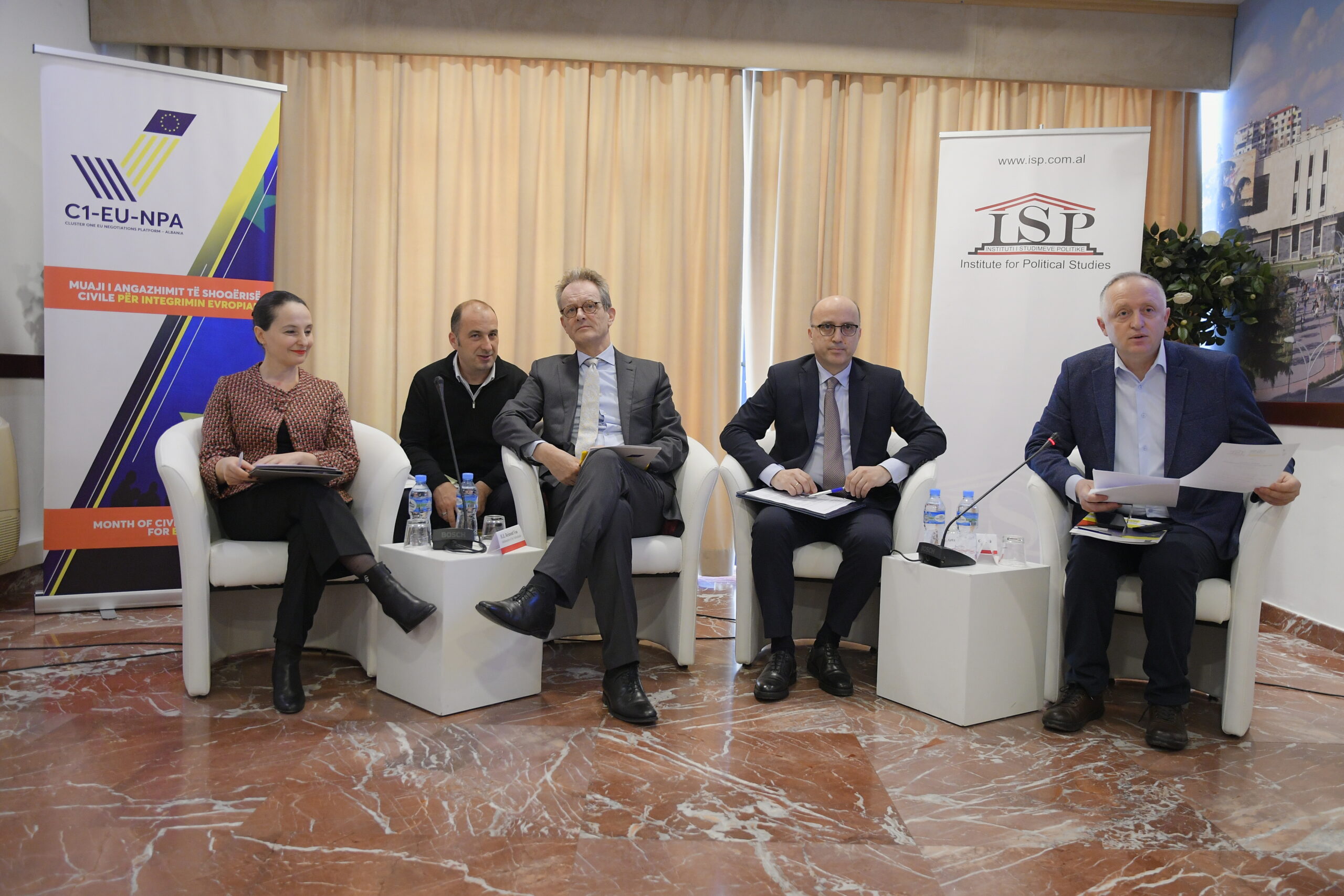High Inspector of Justice Mr. Artur Metani participated in the round table organized by the Institute for Political Studies, to discuss the conclusions of this organization monitoring report – “Role, balance and challenges of HIJ”, which is part of the project “Improved policy debate and accountability to delivering on fundamentals first through the establishment of cluster one EU negotiations platform”, together with some civil society organizations and supported by the Embassy of the Kingdom of the Netherlands in Tirana.
This discussion on the HIJ, as the newest institution of reform in justice, brought together the ambassador of the Netherlands, Mr. Reinout Vos, the minister of state and chief negotiator Ms. Majlinda Dhuka, head of the Committee on Legal Affairs Ms Klotilda Bushka, the vice-chair of the Committee on Legal Affairs Ms. Dhurata Çupi, the chairwoman of the High Judicial Council Ms. Naureda Llagami, the chairman of the High Prosecutorial Council Mr. Alfred Balla, representatives of civil society, inspectors and Cabinet members of the High Inspector of Justice.
Presenting the conclusions of his monitoring report, lecturer Erind Mërkuri focused on the HIJ challenges, which are related to the high number of complaints against judges and prosecutors compared to the incomplete inspection capacities, as well as the fact that the Appeal Chamber has confirmed the disciplinary procedures carried out by the High Inspector of Justice as correct ones.
In his response, High Inspector of Justice Mr. Artur Metani evaluated the HIJ detailed monitoring as the right way to measure the institution’s work with clear indicators. “The shortage of human resources has been a real problem, but this has not prevented HIJ from performing and the results are visible. Justice, in my view, is not a statistic, but what matters are the established standards and the fact that the Councils, HJC and HPC, have always confirmed the findings of the HIJ. These are standards set now and they have also been confirmed by the Appeal Chamber. This means that this is a functioning system and therefore it is important that if the institutions performance, the HIJ performance, is to be evaluated, it should be done using indicators, like this one today, i.e. indicators that draw conclusions on where the institution was, what it has done and where it will go.”
Asked by the moderator, journalist Lutfi Dervishi, about the other HIJ dimension, that of inspections, Mr. Metani said that “the institution does not breathe down magistrate’s neck, but it should be seen as a mechanism that helps to highlight work standards through institutional or thematic inspections, i.e. the help it gives to judges and prosecutors and to the system itself through concrete recommendations.”
The head of the Committee on Legal Affairs Ms. Klotilda Bushka pointed out that despite all its good performance, HIJ should not be the only institution to keep the system accountable and the cooperation among all justice institutions will help to keep things running smoothly.
The vice-chair of the Committee on Legal Affairs, Ms. Dhurata Çupi said, among other things, that beyond the shortages HIJ faces, it must be accepted as a fact that the increase in the number of complaints is evidence of the increased trust of citizens in the High Inspector of Justice, and this great trust gives the institution the burden of public expectation and this is another challenge for the HIJ.
The chairwoman of the High Judicial Council, Ms. Naureda Llagami underlined that regardless of expectations, it should be taken into account that institutions need time and HIJ, HJC or HPC setting standards is very important because it shows that we have a well-functioning system.
The chairman of the High Prosecutorial Council Mr. Alfred Balla evaluated the HIJ performance during these three years, which according to him is also evident from the confirmation that the HPC has made to the HIJ findings in the disciplinary proceedings against prosecutors.
The minister of state and chief negotiator Ms. Majlinda Dhuka in particular evaluated the performance of the High Inspector of Justice in the reports presented to the European Commission within the screening process on chapter 23 of the membership negotiations.
The ambassador of the Netherlands Mr. Reinout Vos, confirmed his country’s support for strengthening the capacities of justice institutions and evaluated the HIJ role. He also underlined that after the vetting process, this is the permanent institution that holds judges and prosecutors accountable for their work standards. “The Netherlands Embassy is supporting this activity as part of the Month of Civic Engagement in EU Integration and guarantees its commitment to remain a strict, fair and committed partner to support Albania and its efforts on the path towards EU membership “, said Mr. Vos.
The head of the Institute for Political Studies, researcher Afrim Krasniqi, said that even this HIJ monitoring shows that the highest expectation of the justice reform is the need for performance review and not only for vetting figures and statistics. “Our wish is for each institution to strengthen its identity, independence and public image, and it is important for each one to have its own performance review and take credit in case of success but also be responsible in case of failure.

